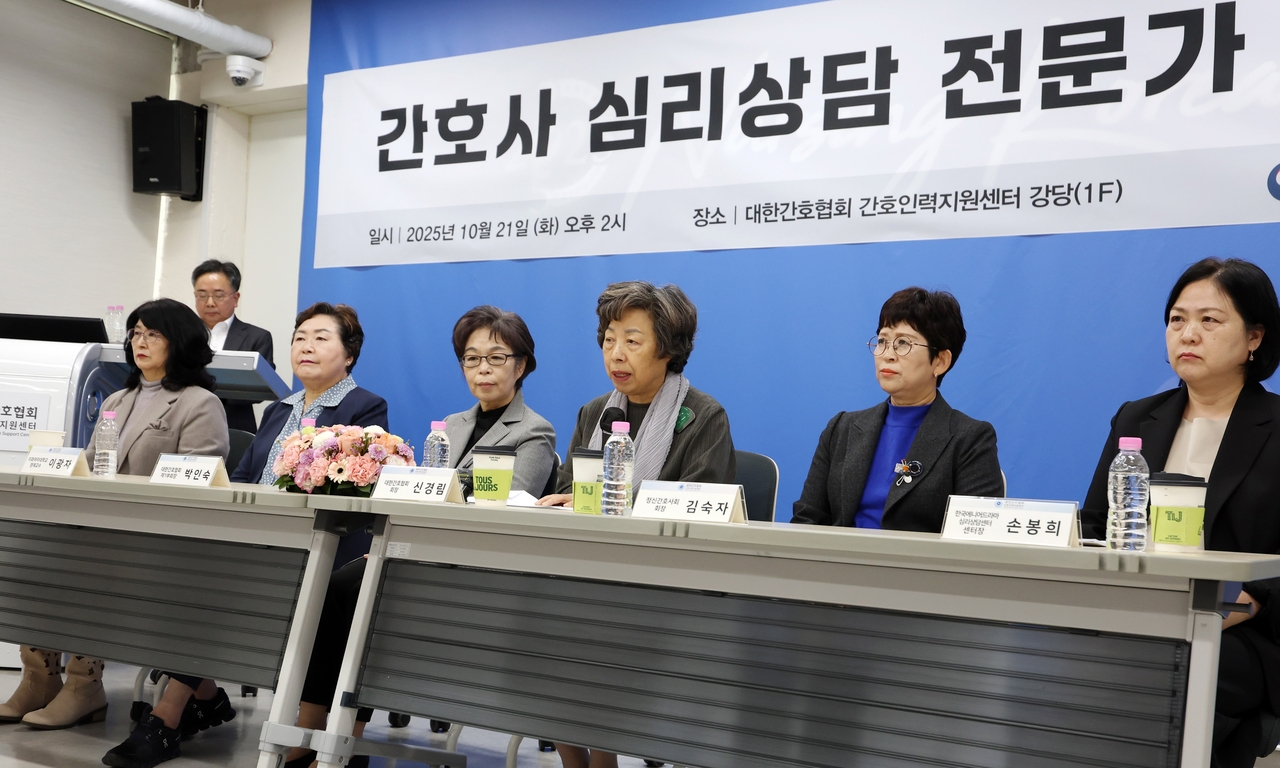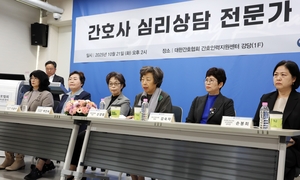Nurses insulted, harassed, assaulted by senior colleagues, doctors and patients, yet more than 70% simply endure
 Korean Nurses Association President Shin Kyung-rim (third from right) delivers opening remarks at a press conference for the launch of a nationwide counseling team for nurses, held at the association’s workforce support center in Seoul on Tuesday. (Newsis)
Korean Nurses Association President Shin Kyung-rim (third from right) delivers opening remarks at a press conference for the launch of a nationwide counseling team for nurses, held at the association’s workforce support center in Seoul on Tuesday. (Newsis) In South Korean hospitals, nurses are being cursed at during surgeries, ordered to run doctors’ personal errands and physically assaulted by patients’ families.
And more than half say no one does anything to stop it.
A new national survey by the Korean Nurses Association has revealed that 1 in 2 nurses (50.8 percent) experienced human rights violations in their workplace in the past year. The most common abuses were verbal attacks (81 percent) and abuse of authority or workplace bullying (69.3 percent), according to results released Monday.
Yet more than 70 percent of those affected said they were unable to take any action. The reasons include lack of reporting protections, fear of retaliation and a deep-rooted culture of silence in Korean health care institutions.
Perpetrators included senior nurses (53.3 percent), doctors (52.8 percent) and patients or their families (43 percent). Most incidents occurred in hospital wards, where staff interact with patients and their guardians face to face.
“During surgery, I was called names I won’t even repeat. We have a system to report this, but if you use it, everyone finds out it was you. And the abuser? Nothing happens,” said one nurse in the KNA’s 2025 survey of 788 nurses across the country.
Another shared in the survey that when she was physically assaulted by a guardian, hospital management told her to simply endure it. Others reported being publicly humiliated by superiors or routinely required to perform personal tasks outside clinical work.
These are not isolated stories. The findings build on growing concerns about the mental health crisis unfolding inside Korea’s hospitals, where nurses are leaving the field in large numbers. According to data from the Hospital Nurses Association, 80 percent of resignations in 2022 came from nurses with fewer than five years of experience, while about 14,000 newly licensed nurses leave the profession within a year.
To begin addressing the crisis, the KNA on Tuesday launched a new task force of 24 licensed mental health professionals, who will provide counseling services to nurses across 10 regions in the country. Services will be provided through the association’s internal support center, with capacity to expand if demand rises.
“Fixing nurses’ treatment is a massive challenge, but mental health support could be the starting point for changing the entire workplace culture,” said Kim Hee-sook, honorary professor of nursing at Kyungpook National University, who spoke at the task force launch event.
Alongside counseling, the KNA has submitted policy proposals to the government, including protections for whistleblowers, standardized response procedures for abuse cases, and structural changes to prevent recurrence.
Choi Hoon-hwa, director of policy at the KNA, said what nurses want most is “a sustainable work environment with a reasonable patient load and a chance to feel fulfillment.” But until those changes come, many are stuck choosing between burnout and silence.
“This isn’t just a staffing issue,” said KNA President Shin Kyung-rim. “When nurses are not mentally healthy, patient safety is at risk. This crisis should concern everyone.”
mjh@heraldcorp.com
